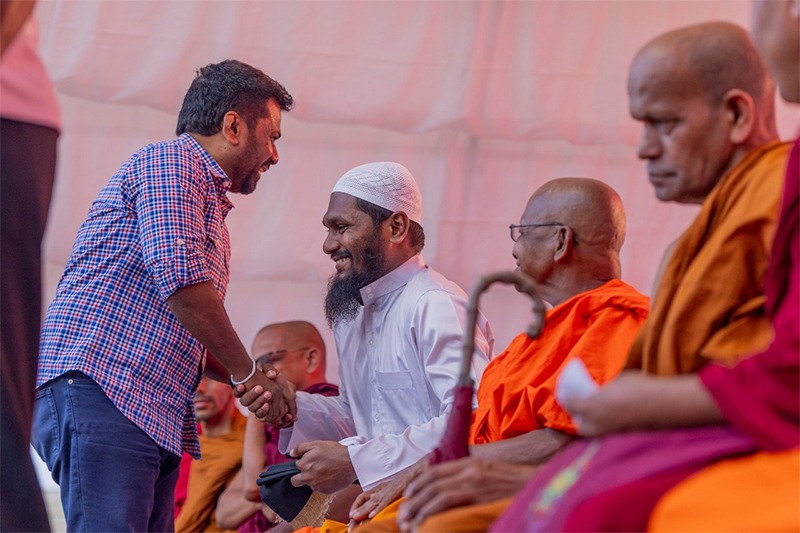-By A LeN Political Correspondent

(Lanka-e-News -29.April.2025, 11.20 PM) Beruwala – In a rally more charged than a thunderstorm over Parliament, President Anura Kumara Dissanayake, Sri Lanka’s leftist firebrand-in-chief, took to the stage last week with a solemn pledge: the social contract between the National People's Power (NPP) and the people will be honoured — and delivered — within his administration’s term. Lofty words in a nation that’s seen more promises broken than election manifestos printed.
Addressing a jubilant crowd at the “Jaya Niyathayi, Gama Apatai” rally on April 27, Dissanayake appeared bullish. “The people made a decision last year to change Sri Lanka’s politics,” he thundered. “Why? Because they wanted economic recovery, to jail the thieves, and to create a corruption-free administration.” In short, a utopia – or what local cynics call a Parliament without politicians.
The president, now six months into his term, wasted no time taking aim at his detractors. “Who’s crying now?” he asked rhetorically. “Those who lost power, who never expected this outcome, who are watching their dreams of dynastic rule dissolve like sugar in tea.” Ouch.
It wasn’t just political shade he was throwing. Dissanayake insisted that economic stability — Sri Lanka’s elusive unicorn — is already being achieved. The rupee, he claimed, has been holding steady against the dollar, inflation has reportedly dropped to a six-month low, and foreign investors who previously ghosted the island are now warming back up.
“China and Japan walked out,” he reminded the crowd, “but now they want back in.” A diplomatic dance, perhaps — or merely the international community’s version of swiping right again.
The president turned bureaucratic too — unveiling plans to allocate 7.8 billion rupees for the irrigation sector this year. That’s enough water to drown the ghosts of past projects that evaporated under corruption. He announced the recruitment of 30,000 new public servants to revive what he called a “crippled state machinery,” with a side note: no political letters required. “Meritocracy,” he insisted, “is coming to the Sri Lankan state service.”
More applause. Perhaps some disbelief.
But Dissanayake, not one to shy away from controversy, trained his guns on ethnic and religious tensions too, pledging zero tolerance. “No more Sinhala, Tamil, Muslim divides,” he declared, referencing a massive crowd in Pudukuduirippu — “the largest public gathering there in recent history.” A unity rally, he claims. Though as always, one wonders if unity in Sri Lanka lasts longer than the post-rally snack lines.
The president’s war on corruption also received his signature flair. “No one can park a car on a public road without registering it. Yet former politicians did exactly that,” he said, name-dropping three unnamed ministers facing future legal scrutiny. “The law now applies equally to all — from the President to the peon.” The crowd roared, but the real test is whether the Attorney General’s Department roars louder than the political class it must prosecute.
He even turned on his own — or at least those who once dined in the VIP lounge. “No pensions, no luxury vehicles, no backdoor privileges for MPs,” he promised. “We’ve cut government expenses to raise public sector salaries. Every rupee saved goes back to the people.”
His austerity rhetoric — no perks for parliamentarians, retirement benefits trimmed — had the poetic sting of a Shakespearean revenge tragedy. Except this time, it's not Macbeth with a dagger, but Comrade AKD with a red file and a public ledger.
Even the famously beleaguered health and education sectors received a mention. Rs. 604 billion has been allocated to healthcare, with a vow to prevent another medical shortage. He dangled the promise of “child-friendly” education reforms, sounding suspiciously like the kind of parent-teacher meeting Sri Lanka has needed for decades.
And tourism? Dissanayake envisions a new Anuradhapura and Jaffna, spruced up with Indian help and free of political cobwebs — transforming sacred cities into world-class holiday destinations. Sri Lankan archaeology, it seems, has never had better PR.
Still, not all was rose-tinted. Dissanayake admitted that his government lacked the power to punish corrupt politicians — that task, he said, lies with the judiciary. But rest assured, he intoned, investigations are underway. “One former President’s son, one grandmother, two provincial governors, and another former Chief Minister — all under scrutiny.”
Not quite Game of Thrones, but we’re getting there.
The anti-corruption commission, long considered a ceremonial watchdog, is being “strengthened,” he said, promising that the days of political interference were over. For now.
And on transport? He wants to make it the best in Asia. A bold dream, given that Colombo’s morning traffic could rival the plot complexity of an HBO drama.
By the end of his speech, Dissanayake appeared as the embodiment of a revolution in progress — part headmaster, part preacher, part accountant. He warned local government institutions not to dare misbehave under a central government that no longer loots or squanders. “We must walk forward together,” he said. “Don’t make us walk backward just because you’re nostalgic for chaos.”
With elections around the corner, he urged voters to give the NPP a “decisive victory.” It was part political campaign, part TED Talk, part cleansing ritual. But in a country where hope has often been a false currency, perhaps the greatest challenge Anura Kumara Dissanayake faces isn’t his political opponents — but the weight of his own words.
Because if delivery falters, the pact he so proudly declared in Beruwala may become just another broken promise carved into the granite of Sri Lanka’s political ruins.
-By A LeN Political Correspondent
---------------------------
by (2025-04-29 18:12:30)
Leave a Reply